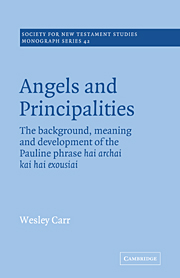 Angels and Principalities
Angels and Principalities Book contents
- Frontmatter
- Contents
- Preface
- Abbreviations
- General Introduction
- PART 1 The Background to Paul's Thought on the Powers
- PART 2 Exegesis of Pauline Texts
- PART 3 The post-Pauline development
- 6 Texts within the New Testament
- 7 Ignatius of Antioch
- 8 The angelomorphic Christology of early Jewish Christianity
- 9 The Greek apologists
- 10 Clement of Alexandria
- 11 The influence of gnosticism
- 12 Origen
- Conclusion to Part 3
- PART 4 Final Remarks
- Notes
- Select Bibliography
- Index
10 - Clement of Alexandria
Published online by Cambridge University Press: 06 January 2010
- Frontmatter
- Contents
- Preface
- Abbreviations
- General Introduction
- PART 1 The Background to Paul's Thought on the Powers
- PART 2 Exegesis of Pauline Texts
- PART 3 The post-Pauline development
- 6 Texts within the New Testament
- 7 Ignatius of Antioch
- 8 The angelomorphic Christology of early Jewish Christianity
- 9 The Greek apologists
- 10 Clement of Alexandria
- 11 The influence of gnosticism
- 12 Origen
- Conclusion to Part 3
- PART 4 Final Remarks
- Notes
- Select Bibliography
- Index
Summary
On two counts a place in this survey must be found for Clement of Alexandria. As a thinker in his own right he demonstrates many of the important trends in Christian thought in the second half of the second century. Although he worked mainly in Alexandria with its Graeco-Egyptian culture, he had also travelled and his writings and thought are thoroughly Greek. In the second place, he is important as the immediate predecessor of Origen, the man who above all contributed to the theology of cosmic forces.
Clement's philosophy is fundamentally Platonic. In Strom. 5.92.5f, in a discussion of Greek borrowings from Hebrew literature, Clement speaks of the Devil, ‘the Prince of Demons’, with reference to Plato, Leg. 10.896DE, Phaedr. 240AB, and Leg. 10.906A. In his exposition of the Platonic world soul, he simply mentions the texts and does not attempt to come to grips with the problem of evil in the world. This is for him, as it was for Plato, one of the given facts of life, and Clement shows himself to be at some remove from the problem of the experience of a force of evil to which the Christian message might attempt the offer of salvation. On the other hand, he also shows that he is fully conversant with the Judaeo-Christian tradition, by which the demons are identified with the fallen angels and are wholly evil. They are greedy for bloody sacrifices and are worshipped in the guise of idols.
- Type
- Chapter
- Information
- Angels and PrincipalitiesThe Background, Meaning and Development of the Pauline Phrase hai archai kai hai exousiai, pp. 153 - 157Publisher: Cambridge University PressPrint publication year: 1981
